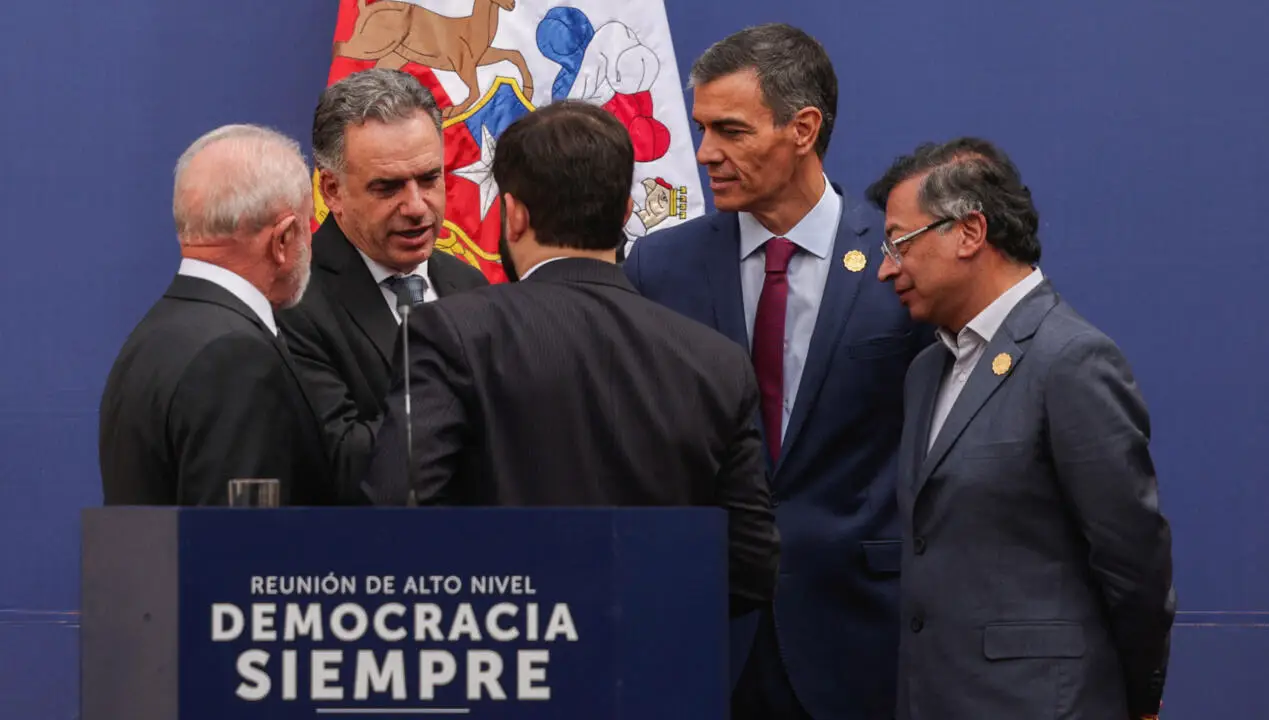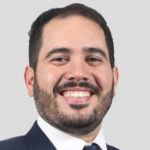The recent “Democracy Always” high-level summit held in Santiago, Chile, brought together a handful of Latin American left-wing presidents along with the Spanish prime minister, Pedro Sánchez. Marketed as a forum to defend democracy, promote multilateralism, and fight disinformation, the event also offered a revealing snapshot of how Spain’s ruling leadership is using Latin America as an alternative stage to relaunch political discourses that no longer resonate at home. Has Latin America become the outlet store of Spanish politics?
Pedro Sánchez, the only European leader in attendance, landed in Chile amid a political storm back in Spain. The country is on fire: corruption scandals reaching the heart of his government, a reinvigorated opposition, and a public increasingly skeptical of the executive’s moralizing rhetoric. In this context, Sánchez’s presence in South America can hardly be seen as a selfless diplomatic gesture. It is more accurately understood as a political maneuver—an attempt to project international leadership while his domestic authority crumbles.
Moral authority
Spain’s foreign policy toward Latin America has long been ambivalent—sometimes paternalistic, sometimes absent, and occasionally, as now, plainly instrumental. Sánchez did not come to listen—he came to instruct. In his speech, he called for an “offensive” against what he labeled the “reactionary international,” a coalition of far-right forces attacking democratic values on both sides of the Atlantic. The problem isn’t the diagnosis. It’s the context: What moral authority does a scandal-plagued prime minister truly have to lecture others on democratic ethics?
Joining him in the group photo were other leaders whose legitimacy is also under scrutiny. Luiz Inácio Lula da Silva, president of Brazil, arrived in high spirits following what appears to be a diplomatic win: recent U.S. trade actions against Brazil—triggered by the trial of Jair Bolsonaro—have revived his popularity. But Lula is no political newcomer, nor an untouchable symbol. His return to power has been both celebrated and questioned. His alliance with Sánchez seems driven more by political shielding than by a shared vision for the future.
Colombian president Gustavo Petro is arguably the group’s most problematic figure. His administration is beset by scandals of all kinds, his coalition has fractured, and his confrontational style has only deepened political polarization, stalling any meaningful reform. Petro today is neither a reliable domestic leader nor a trustworthy international partner. His presence at the summit, far from strengthening its message, weakens it.
What do countries gain?
Uruguay’s president Yamandú Orsi, the most recently elected of the group, was also the most cautious. His participation seemed more like a diplomatic courtesy than a full ideological alignment. Still, his presence raises questions: What does Uruguay gain by aligning with a bloc seemingly more focused on rhetoric than on results?
The host, Gabriel Boric, closes the picture with a paradox. Once a symbol of renewal, he now exits office with low approval ratings and a resounding defeat of his party in Chile’s left-wing primaries. The victory of Jeannette Jara, the Communist Party’s candidate, marks a shift that leaves Boric in an awkward position—as organizer of a summit that no longer represents even the future of his own political camp.
“Democracy Always” was presented as an effort to build a narrative alternative to the rise of the far right. But in practice, it functioned more like a self-affirmation club for embattled leaders. The rhetoric of democratic defense loses its punch when it comes from those who struggle to uphold it at home.
Spain, in particular, should reflect on how it uses Latin America as a political repositioning platform. It’s not the first time this has happened, but rarely has it been so obvious. Rather than building relationships rooted in mutual respect and effective cooperation, Spain continues to push an ideological export model that has little to do with the region’s actual needs.
Listen more, preach less
Politics is not a dumping ground for narratives that no longer sell at home. Nor is it a space reserved only for like-minded voices. That’s one reason why “Democracy Always” sparked high-level political resistance in some quarters. Latin America does not need sermons—it needs partners. If Spain’s prime minister hopes to play a relevant role in the region, he must abandon the temptation of moral superiority and foster a genuine, diverse dialogue that brings different actors to the table. In short: listen more, preach less.
The summit in Chile left behind a clear image: a group of leaders who, rather than building the future, seem stuck clinging to the past—the past of the first progressive wave, when lofty speeches inflated by high commodity prices were enough to govern. But those days are long gone, and politics, like history, has little patience for those who insist on recycling worn-out formulas.
*Machine translation, proofread by Ricardo Aceves.













